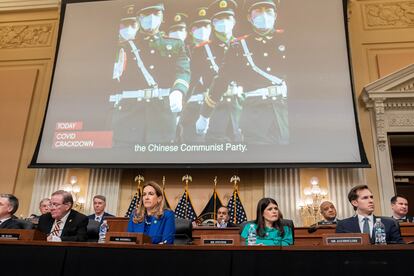Ukraine, Covid and TikTok stir up increased tensions between the US and China
Washington has issued a warning against any attempt by Beijing to provide military support to Moscow while the FBI assesses coronavirus originated in a ‘potential lab incident in Wuhan’


It might have been taking place two millennia later and far beyond the Pillars of Hercules, but to the Roman senator Cato the Elder, who famously said Carthago delenda est (Carthage must be destroyed) the atmosphere in Room 390 of the Cannon House Office Building at the United States Capitol would have seemed very familiar. Over the course of three hours, some 20 Republican and Democratic lawmakers and four experts heaped criticism upon President Xi Jinping’s government at the first hearing of the new Select Committee on the Strategic Competition Between the United States and the Chinese Communist Party. The rivalry between Washington and Beijing, stressed the committee’s chairman, Republican Mike Gallagher, is “an existential struggle over what life will look like in the 21st century.” The US has recently been intensifying pressure on China in various areas - diplomatic, technological and even medical – at the rivalry between Washington and Beijing becomes increasingly bitter.
This ramping up is due, in part, to concerns on Capitol Hill over the role Beijing may take in the war in Ukraine, with the conflict poised to enter a new phase of battlefield offensives. High-ranking officials in the administration of President Joe Biden have voiced concerns that China - which last week called for a cease-fire and presented a 12-point proposal to bring the conflict to an end - has for the first time since Russian President Vladimir Putin ordered the invasion a year ago begun to consider sending weaponry to Moscow. While Biden has said he does not “anticipate a major initiative on the part of China providing weaponry to Russia,” he also warned that if that were to transpire he “would respond,” raising the specter in Washington of a drastic escalation of tensions.
Biden also addressed Beijing’s peace proposal, stating he had seen “nothing in the plan that would indicate that there is something that would be beneficial to anyone other than Russia.” Over the past few days, the White House and the State Department have stressed that providing support to Moscow would lead China into very dangerous territory. “Beijing will have to make its own decisions about how it proceeds, whether it provides military assistance. But, if it goes down that road, it will come at real costs to China. And I think China’s leaders are weighing that as they make their decisions” National Security Advisor Jake Sullivan told CNN. “We want to be crystal-clear that that would be a poor decision, should they decide to do that,” Pentagon Press Secretary Brigadier General Pat Ryder said during a press briefing.
The increase in “public and sustained” pressure to dissuade Beijing from assisting Moscow “suggests that the United States perceives a limited ability to influence the opinion of Chinese decision-makers through bilateral contacts and that Washington will adopt a more confrontational attitude in the future,” noted the Eurasia Group consulting firm, which has raised its expectations of a rapid decline in relations between the two superpowers this year from 30% to 40%.
The posturing of Washington and Beijing also reflects the gradual deterioration of a relationship where rivalry - be it geopolitical, military or commercial - is increasingly accentuated. Mistrust is the primary sentiment, as evidenced by the crisis brought about by the Chinese balloon that was shot down over US territory in February. This distrust is shared both by political representatives and by a society that largely subscribes to negative opinions of the Asian giant. The proximity of the 2024 presidential elections also makes a tough stance against China politically profitable.

Microchips, Covid and TikTok raise tensions
Washington’s diplomatic warnings have been followed by the implementation of economic measures. After the imposition of sanctions on Chinese companies last week for their ties to the Russian Wagner Group, mercenaries who are heavily involved in fighting around the Ukrainian city of Bakhmut, the Department of Commerce has imposed strict limits on the operations of semiconductor manufacturing companies in China: those wishing to receive resources from the $39 billion fund set up by the US government to develop the microchip sector will have to refrain from expanding their operations in China for a decade. This measure is aimed at stimulating the domestic sector while at the same time preventing Beijing from indirectly benefiting from these funds.
An old wound has also been reopened: the origins of Covid-19. One of the main bones of contention between Washington and Beijing during the Donald Trump presidency had been put on the back burner after a Biden-ordered investigation failed to produce conclusive results. But an updated US Energy Department report leaked to the media this week hints, albeit with a “low level” of confidence, that the pandemic may have arisen from a laboratory leak in the Chinese city of Wuhan, where the first cases of the disease were detected. FBI Director Chris Wray has fueled the controversy by acknowledging in an interview with Fox News that his agency “has for quite some time now assessed that the origins of the pandemic are most likely a potential lab incident in Wuhan.”
Tough-on-China initiatives are not limited to the government. The US Congress, where Democrats control the Senate and Republicans control the House of Representatives, has also made it clear that it is hostile territory for Beijing. A bill being pushed by Republicans in the House would grant Biden powers to ban the hugely popular Chinese social network TikTok, which has already been prohibited for use on the on the electronic devices of federal officials.
On Tuesday alone, four House committees were holding four different hearings on the rivalry between Washington and Beijing. The main event was the first session of the new House Special Committee on Strategic Competition between the United States and the Communist Party of China, created at the urging of Republicans. Under the title “The Chinese Communist Party’s Threat to America,” lawmakers from both parties and four experts - two of them members of the Trump administration, former National Security Advisor Herbert McMaster and his China advisor, Matt Pottinger – set about lambasting Xi Jinping’s government.
“Over the last three decades, both Democrats and Republicans underestimated the CCP and assumed that trade and investment would inevitably lead to democracy and greater security in the Indo-Pacific region, including in the PRC. Instead, the opposite happened,” said Democratic congressman Raja Krishnamoorthi, the committee’s ranking member.
The rivalry will continue but as pressure mounts, the United States has also made it clear that it is not seeking either a confrontation or complete disengagement with China. Although Secretary of State Antony Blinken called off his planned visit to Beijing in the wake of the balloon incident, he met with China’s chief diplomat, Wang Yi, in Munich a week later. And contacts between the countries continue.
“The United States and China have engaged in efforts to expand their bilateral ties and create some stability in the relationship since Presidents Biden and Xi met at the G-20 summit last November,” states the Eurasia Group. As yet, there have been no calls for Sinae delenda est (China must be destroyed).
Sign up for our weekly newsletter to get more English-language news coverage from EL PAÍS USA Edition
Tu suscripción se está usando en otro dispositivo
¿Quieres añadir otro usuario a tu suscripción?
Si continúas leyendo en este dispositivo, no se podrá leer en el otro.
FlechaTu suscripción se está usando en otro dispositivo y solo puedes acceder a EL PAÍS desde un dispositivo a la vez.
Si quieres compartir tu cuenta, cambia tu suscripción a la modalidad Premium, así podrás añadir otro usuario. Cada uno accederá con su propia cuenta de email, lo que os permitirá personalizar vuestra experiencia en EL PAÍS.
¿Tienes una suscripción de empresa? Accede aquí para contratar más cuentas.
En el caso de no saber quién está usando tu cuenta, te recomendamos cambiar tu contraseña aquí.
Si decides continuar compartiendo tu cuenta, este mensaje se mostrará en tu dispositivo y en el de la otra persona que está usando tu cuenta de forma indefinida, afectando a tu experiencia de lectura. Puedes consultar aquí los términos y condiciones de la suscripción digital.








































